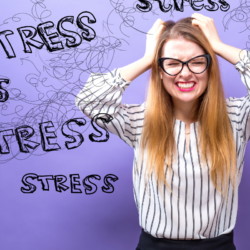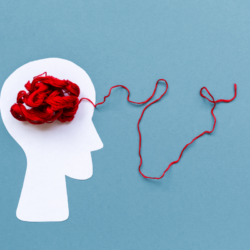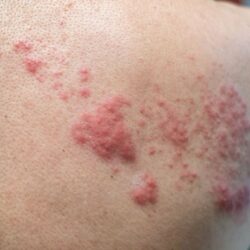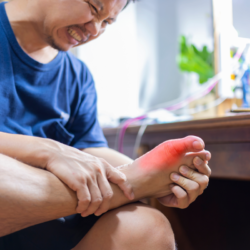Emotionality refers to the human body’s ability to react to physical stimuli and to changes in its organic or psychological situation, such as stage fright. It expresses itself simultaneously in the psychic sphere, through an affect(grief, fear, anger, joy, for example) and/or in the somatic sphere, through various neurovegetative reactions(endocrine vaso-motor, secretory, muscular, etc.).
In this article, we explore stage fright, this intense and often paralysing emotional reaction, by looking at its various physical and psychological manifestations. We look at targeted homeopathic solutions such as Gelsemium and Staphysagria, offering natural alternatives for managing anxiety and pre-event stress. In addition, we discuss relaxation and mental preparation techniques, essential for a holistic approach to stage fright. Our aim is to provide practical and effective strategies for overcoming this emotional challenge, by combining homeopathic medicine and wellness methods.How can stage fright be explained?
Stage fright is a special case of the irrational emotional reaction which occurs in particular in impressionable people before a dreaded event(exam, performance, etc.). The symptomology of acute emotional disorders is highly polymorphous.
Most of the time, we find the following characteristics:
- Tachycardia, high or low blood pressure.
- Redness or paleness of the integuments.
- Tense, relaxed muscles, tremors. Tensations frequently affect the face and pharyngo-larynx, leading to a change in respiratory amplitude and frequency with hyperventilation. This hyperventilation may in turn trigger a tetany attack as a result of the induced gaseous alkalosis.
- Diarrhoea, colonic spasms.
- Polyuria.
A differential diagnosis must therefore be made with anxiety (where there is no specific triggering factor), and an effort made to understand the significance of this acute emotional disorder:
- A temporary reaction to a new situation.
- Onset of an underlying psychiatric illness: anxiety neurosis, borderline state, psychosis, depression.
Which homeopathic treatments should I choose to manage stage fright?
If you are dealing with a genuine emotional disorder, homeopathy is a perfectly suitable treatment.
Gelsemium :
Gelsemium-type symptomatology appears most of the time in situations of stage fright or in phases of depressing emotions. The patient is obsessed, stupefied by fear, with no memory because it is impossible to concentrate. They experience general muscular fatigue, sometimes trembling or feeling achy. They may complain of headaches, migraines, dizziness or lipothymia, diplopia, and a feeling that their heart is about to stop if they don’t move. Very often, he has a tendency to diarrhoea. When the emotional reaction improves, polyuria may appear.
Dosage: Before an examination, take one dose of Gelsemium 30CH the evening before, and one dose on the morning of the examination. In subjects who are particularly anxious in advance, Gelsemium 30CH should be taken once a week for a month, possibly supplemented by 5 granules each morning of Ignatia 9CH, if all or part of the symptoms of Ignatia are present. In the case of an acute emotional disorder, take a dose of Gelsemium 30CH as soon as possible, to be repeated when the therapeutic effect has worn off.
When should I take Gelsemium granules?
The remedy Gelsemium, available in different dilutions such as 4CH, 5CH, 7CH, 9CH, 12CH, 15CH, 30CH, is a commonly used homeopathic medicine. Here are a few cases where this remedy could be considered:
- Pre-event Anxiety and Stress: Gelsemium is often recommended for symptoms of anxiety and stress that occur before a stressful event, such as an exam, interview or public speaking engagement. It helps manage the tremors, weakness, headaches and diarrhoea that can be associated with this nervousness.
- Migraines and tension headaches: This remedy is sometimes used to treat migraines and tension headaches, particularly when associated with feelings of heaviness and weakness. People who benefit from Gelsemium for headaches often experience pain that starts at the back of the head and spreads forward, or a feeling of tightness around the head.
- Febrile states and flu symptoms: In the case of flu or febrile states, Gelsemium may be indicated, especially if symptoms include tiredness, chills, muscle aches and a lack of thirst. It is particularly suitable for flu-like conditions that develop slowly and are accompanied by great weakness and heaviness of the eyelids.
- Sleep disorders: For individuals suffering from insomnia due to anxiety or anticipation of future events, Gelsemium can offer relief. It helps to calm the mind and promotes natural, restful sleep.
Ignatia amara :
The symptoms ofIgnatia most often appear after grief, sentimental disappointment, bereavement, fear, vexation or in anticipation of stage fright. In short, the patient presents with a variable, polymorphous and often contradictory symptomatology, as well as a labile anxiety.
These include:
- Hyperesthesia of all the senses.
- Palpitations, nervousness, insomnia.
- Anorexia or nervous hunger.
- A localised headache that feels like a nail being hammered into the skull.
- A tendency to spasm, with the sensation of a lump in the throat rising from the stomach, improved by sighing, breathing deeply or yawning.
- Sensations of colonic spasms, particularly in the right iliac fossa.
All these symptoms are clearly improved by distraction.
Dosage: If the clinical picture consists mainly of spasms, take Ignatia 9CH, 5 granules 2 times a day, spacing out according to improvement. Ignatia is also indicated for spasms of the sob in young children and for their prevention. For a more complete clinical picture, take a dose of 15CH, to be repeated if the symptoms reappear.
Argentum nitricum :
The symptoms ofArgentum nitricum most often appear in the face of stage fright, fear or psychological overwork. The clinical expression of the emotional reaction is mainly digestive, either in the form of eructation with pain in the epigastric cavity, or in the form of diarrhoea. This symptomatology will therefore appear in nervous, agitated subjects who want to finish what they start before they have even begun. This is the homeopathic remedy for anxiety caused by anticipation.
Moreover, during exams, these subjects speak volubly, without any logical order. They write too quickly, crossing things out, for fear of not being able to express all the ideas running through their heads. They complain of headaches and fatigue due to emotional overload.
Dosage: When digestive symptoms are predominant, take Argentum nitricum 9CH, 5 granules several times a day, spacing out as the symptoms improve. If the symptoms are more general, take a dose of 15 or 30CH, to be repeated when the symptoms reappear. If the reaction is known and usual, Argentum nitricum can be taken as a preventive measure in the same way as Gelsemium.
Ambra grisea :
It is preferable to take this medicine in particularly hypersensitive, very shy people. Their emotional disorder is expressed by fatigue, trembling, spasms, hyperreflexia, a nervous cough and insomnia.
Dosage: Take in 9CH or 15CH depending on the degree of similarity, one dose to be repeated if symptoms reappear.
Moschus :
This medicine is indicated when there is a tendency to faint, palpitations, a need to take deep breaths, nervous hyperexcitability with alternating crying and laughter. It is particularly suitable for individuals (most often women) prone to theatrical manifestations frequently linked to an underlying sexual problem. This homeopathic remedy is used in cases of spasmophilia.
Dosage: Prescribe a daily dose of 9, 15 or 30CH. Space out according to improvement.
Staphysagria :
Indicated for individuals with psychosomatic pathology directly linked to emotional disorders, in particular cystalgia and pruritus. Symptoms most often appear in the aftermath of failure or humiliation.
On the usual behavioural level, the subjects are:
- Rapidly indignant or offended
- Highly susceptible, hypersensitive to the slightest words they believe are directed against them.
Dosage: Take a dose of Staphysagria 9, 12, 15 and 30CH 4 mornings in a row, in a “ladder”, then, depending on improvement, a dose of Staphysagria 30CH once a week to once a month.
When should Staphysagria granules be taken?
Staphysagria, a homeopathic remedy available in various dilutions such as 4CH, 5CH, 7CH, 9CH, 12CH, 15CH, 30CH, is often used in a number of specific situations. Here are a few cases where taking Staphysagria granules could be considered:
- Emotional Trauma and Suppressed Anger: Staphysagria is frequently recommended for individuals who have experienced emotional trauma, particularly those where anger or indignation has been suppressed. These situations may include emotional or physical abuse. The remedy helps to manage pent-up emotions and relieve the resulting psychological tension.
- Post-surgical dermatological problems: In dermatology, Staphysagria can be used to promote healing after surgical procedures, such as cuts or incisions. It is particularly useful in cases of pain or itching on surgical scars.
- Urinary tract infections and genito-urinary disorders: This remedy may be indicated in cases of recurrent urinary tract infections, especially if they are linked to emotional stress or frustration. Staphysagria is also used to treat certain genital conditions, such as cystitis after sexual intercourse.
- Symptoms of Post-Traumatic Stress: In cases of post-traumatic stress, where the individual experiences irritability, mood swings and increased emotional sensitivity following a traumatic event, Staphysagria can offer emotional support and help manage symptoms.
Prevention and overall management of stage fright
Stage fright, that unwelcome companion at crucial moments, need not be seen as inevitable. There are ways of preventing it and comprehensive strategies for dealing with it effectively. Prevention is essential, because it allows you to approach stressful situations with less apprehension and more serenity.
Relaxation and stress management techniques
Relaxation and stress management are valuable allies in the prevention of stage fright. Various techniques can be used to reduce the physical and psychological symptoms of stress. Mindfulness meditation, for example, helps you refocus on the present moment and reduce anxious thoughts about the future. It is practised by concentrating on breathing or on soothing visualisations, which help to calm the mind.
Diaphragmatic breathing is also a powerful tool against stage fright. Deep breathing sends a signal to the body that it is not under threat, which can slow the heart rate and reduce muscle tension. In addition, techniques such as yoga or tai chi, which combine movement and concentration, can also help to manage stress by improving body awareness and promoting relaxation.
The effectiveness of regular physical exercise should not be underestimated either. Physical activity releases endorphins, often called happy hormones, which have a beneficial effect on mood and reduce stress.
The importance of mental preparation
Mental preparation is just as crucial as physical preparation. Thinking positively about the situations ahead can turn stage fright into a motivating energy rather than a blockage. Positive visualisation, which consists of mentally projecting oneself in the process of achieving a successful performance, is a technique commonly used by top-level sportspeople. It can be just as effective for anyone faced with a stressful event.
Self-talk also has a considerable impact on managing stage fright. Talking to yourself with kindness and encouragement, rather than with negative and devaluing words, can boost your self-confidence and reduce anxiety.
In addition, preparing thoroughly for the event is a form of mental preparation. This involves knowing your subject well, rehearsing and simulating real-life conditions to familiarise yourself with the situation.
Preventing stage fright is therefore not limited to one-off interventions, but involves a holistic approach incorporating regular relaxation practices and solid mental preparation. This requires personal commitment and sometimes the support of a professional, but the benefits in terms of quality of life and performance are undeniable.







